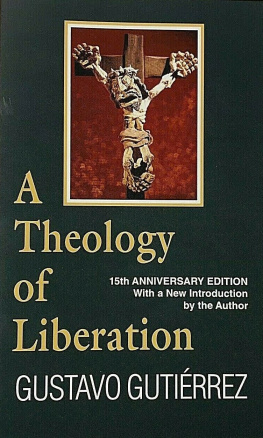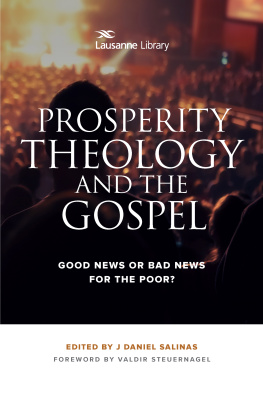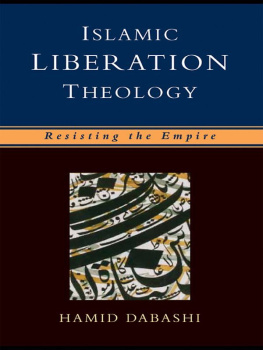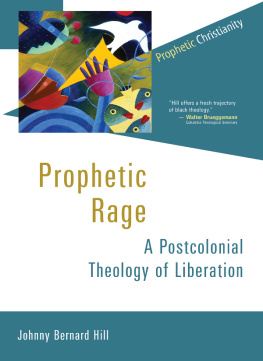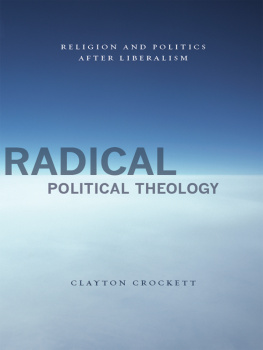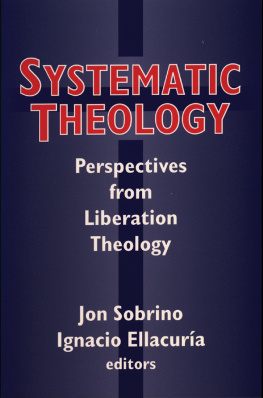A THEOLOGY OF LIBERATION
GUSTAVO GUTIRREZ
A THEOLOGY OF LIBERATION
History, Politics, and Salvation
Revised Edition with a New Introduction
Translated and edited by Sister Caridad Inda and John Eagleson

The Catholic Foreign Mission Society of America (Maryknoll) recruits and trains people for overseas missionary service. Through Orbis Books Maryknoll aims to foster the international dialogue that is essential to mission. The books published, however, reflect the opinions of their authors and are not meant to represent the official position of the society.

Originally published as Teologia de la liberacin, Perspectival by CEP, Lima, 1971
The text of this book is a revised version of the original English-language translation 1973 Orbis Books, Maryknoll, NY 10545; the present book contains a new introduction by the author, translation 4 1988 Orbis Books
All rights reserved Manufactured in the United States of America
Manuscript editor and indexer: William E. Jerman
New introduction and revisions to this edition translated by Matthew J. O'Connell
LIBRARY OF CONGRESS
Library of Congress Cataloging-in-Publication Data
Gutierrez, Gustavo 1928
[Teologia de la liberacin. English]
A theology of liberation: history, politics and salvation/
Gustavo Gutirrez; translated and edited by Sister Caridad Inda and John Eagleson.
p. cm.
Translation of: Teologia de la liberacin.
Originally published: Maryknoll, N.Y.: Orbis, 1973. With new introd.
Includes bibliographical references and index.
ISBN 0-88344-543-3. ISBN 0-88344-542-5 (pbk.)
1. Liberation theology. I. Title.
BT83.57.G88313 1988 230' . 2 - dc19
EBOOK ISBN: 978-1-60833-125-9
To
Jos Mara Arguedas
and Henrique Pereira Neto
Nunca quiso ayudar a la misa en las fiestas principales de la comunidad. El cura de un distrito vecino que venia a celebrarlas le pidi que hiciera de sacristan, le exigi muchas veces. Lahuaymarca tenia un sacristan Indio.
se no sabe. Repite las palabras como loro, no entiende; Iasi no es cristiano. T eres mestizo, organista, contestas en latin. La misa ser ms grande contigole dijo el cura en la vispera de una fiesta grande.
Quemado yo padre. Mi iglesia dentro de mi pecho, quemado. Cmo voy a cantar? La Gertrudis igual que ngel canta. El sacristn contesta.
La Gertrudis no piensa en Dios; canta triste, s, porque es deforme.
Padrecito, t no entiendes el alma de indios. La Gertrudis, aunque no conociendo a Dios, de Dios es. Quien, si no, le dio esa voz que limpia el pecado? Consuela al triste, hace pensar al alegre; quita de la Sangre cualquier suciedad.
Bueno, terco. No puedo obligarte. Esa "Kurku" tiene
algo, algo extrano, duele.
El Dios, pues, padrecito. Ella ha sufrido entre los seores. Dios de los senores no es igual. Hace sufrir sin consuelo.
... Ha llegado amarillo, rotoso, sin chullu siquiera. Ha regresado igual de su ropa, pero en su ojo habia Dios ...
Que Dios? Como sabes?
Dios es esperanza. Dios alegra. Dios nimo. Lleg "unpu," enjuermo, agachadito. Sali tieso, juirme, aguila. Era mozo no ms. Dios hay aqu, en Lahuaymarca. De San Pedro se ha ido, creo para siempre.
T tampoco eres cristiano verdadero, hijo. Tantos aos de sacristn! Y piensas como brujo. Dios est en todas partes, en todas partes ...
El viejo sacristn de San Pedro mova negativamente la cabeza.
Habia Dios en el pecho de los que rompieron el cuerpo del inocente maestro Bellido? Dios est en el cuerpo de Ios inginieros que estn matando "La Esmeralda " ? De seor autoridad que quit a sus dueos ese maizal donde jugaba la Virgen con su Hijito, cada cosecha? No me hagas Ilorar, padrecito. Yo tarnbin como muerto ando. Don Demetrio tiene Dios, en la "Kurku" est Dios, cantando; en don Bruno pelea Dios con el demonio; para m no hay consuelo, de nadies.
JOSE MARIA ARGUEDAS
Todas las sangres
INTRODUCTION TO
THE ORIGINAL EDITION
This book is an attempt at reflection, based on the gospel and the experiences of men and women committed to the process of liberation in the oppressed and exploited land of Latin America. It is a theological reflection born of the experience of shared efforts to abolish the current unjust situation and to build a different society, freer and more human. Many in Latin America have started along the path of a commitment to liberation, and among them is a growing number of Christians; whatever the validity of these pages, it is due to their experiences and reflections. My greatest desire is not to betray their experiences and efforts to elucidate the meaning of their solidarity with the oppressed.
My purpose is not to elaborate an ideology to justify postures already taken, or to undertake a feverish search for security in the face of the radical challenges that confront the faith, or to fashion a theology from which political action is "deduced." It is rather to let ourselves be judged by the word of the Lord, to think through our faith, to strengthen our love, and to give reason for our hope from within a commitment that seeks to become more radical, total, and efficacious. It is to reconsider the great themes of the Christian life within this radically changed perspective and with regard to the new questions posed by this commitment. This is the goal of the so-called theology of liberation.
Many significant efforts along these lines are being made in Latin America. Insofar as I know about them, they have been kept in mind and have contributed to this study. I wish to avoid, however, the kind of reflection that legitimately concerned with preventing the mechanical transfer of an approach foreign to our historical and social coordinatesneglects the contribution of the universal Christian community. It seems better, moreover, to acknowledge explicitly this contribution than to introduce surreptitiously and uncritically certain ideas elaborated in another contextideas that can be fruitful among us only if they undergo a healthy and frank scrutiny.
A reflection on the theological meaning of the process of human liberation throughout history demands methodologically that I define my terms. The first part of this book is devoted to that purpose. This will enable me to indicate why I pay special attention in this work to the critical function of theology with respect to the presence and activity of humankind in history. The most important instance of this presence in our times, especially in underdeveloped and oppressed countries, is the struggle to construct a just and fraternal society, where persons can live with dignity and be the agents of their own destiny. It is my opinion that the term development does not well express these profound aspirations. Liberation, on the other hand, seems to express them better. Moreover, in another way the notion of liberation is more exact and allembracing: it emphasizes that human beings transform themselves by conquering their liberty throughout their existence and their history. The Bible presents liberationsalvationin Christ as the total gift, which, by taking on the levels I indicate, gives the whole process of liberation its deepest meaning and its complete and unforeseeable fulfillment. Liberation can thus be approached as a single salvific process. This viewpoint, therefore, permits us to consider the unity, without confusion, of th e various human dimensions, that is, one's relationships with other humans and with the Lord, which theology has been attempting to establish for some time; this approach will provide the framework for our reflection.
Next page
